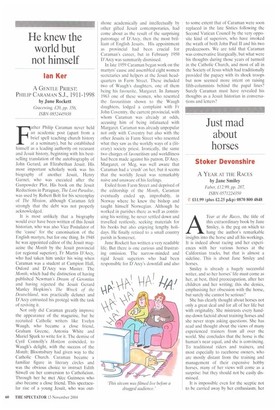He knew the world but not himself
Ian Ker
A GENTLE PRIEST: PHILIP CARAMAN Si., 1911-1998 by June Ruckett Gracewing, £20, pp. 356. ISBN 0852445938 Father Philip Caraman never held an academic post (apart from a brief spell teaching church history at a seminary), but he established himself as a leading authority on recusant and Jesuit history, beginning with his bestselling translation of the autobiography of John Gerard, an Elizabethan Jesuit. His most important scholarly work was his biography of another Jesuit, Henry Garnet, who was executed after the Gunpowder Plot. His book on the Jesuit Reductions in Paraguay, The Lost Paradise, was used by Robert Bolt for his screenplay of The Mission, although Caraman felt strongly that the debt was not properly acknowledged.
It is most unlikely that a biography would ever have been written of this Jesuit historian, who was also Vice Postulator of the 'cause' for the canonisation of the English martyrs, but for one thing. In 1948 he was appointed editor of the Jesuit magazine the Month by the Jesuit provincial (or regional superior), Fr Martin D'Arcy, who had taken him under his wing when Caraman was a student at Campion Hall, Oxford and D'Arcy was Master. The Month, which had the distinction of having published Newman's Dream of Gerontius and having rejected the Jesuit Gerard Manley Hopkins's The Wreck of the Deutschland, was practically defunct and D'Arcy entrusted his protégé with the task of reviving it.
Not only did Caraman greatly improve the appearance of the magazine, but he recruited Catholic writers like Evelyn Waugh, who became a close friend, Graham Greene, Antonia White and Muriel Spark to write for it. The demise of Cyril Connolly's Horizon coincided, to Waugh's delight, with the success of the Month; Bloomsbury had given way to the Catholic Church. Caraman became a familiar figure in literary circles and was the obvious choice to instruct Edith Sitwell on her conversion to Catholicism. Through her he met Alec Guinness who also became a close friend. This spectacular rise of a young Jesuit, who was out
shone academically and intellectually by other gifted Jesuit contemporaries, had come about as the result of the surprising patronage of D'Arcy, then the most brilliant of English Jesuits. His appointment as provincial had been crucial for Caraman's career, but in February 1950 D'Arcy was summarily dismissed.
In late 1959 Caraman began work on the martyrs' cause and assembled eight women secretaries and helpers at the Jesuit headquarters in Farm Street. These included two of Waugh's daughters, one of them being his favourite, Margaret. In January 1963 one of these women, who resented the favouritism shown to the Waugh daughters, lodged a complaint with Fr John Coventry, the current provincial, with whom Caraman was already at odds, accusing him of being infatuated with Margaret. Caraman was already unpopular not only with Coventry but also with the other Jesuits in Farm Street who resented what they saw as the worldly ways of a (literary) society priest. Ironically, the same two charges of favouritism and worldliness had been made against his patron, D'Arcy. Margaret, or Meg, was well aware that Caraman had a 'crush' on her, but it seems that the worldly Jesuit was remarkably naive and unaware of his feelings.
Exiled from Farm Street and deprived of the editorship of the Month, Caraman eventually ended up, improbably, in Norway where he knew the bishop and taught himself Norwegian. Although he worked in parishes there as well as continuing his writing, he never settled down and travelled restlessly, seeking materials for his books but also enjoying lengthy holidays. He finally retired to a small country parish in Somerset.
June Rockett has written a very readable life. But there is one curious and frustrating omission. The narrow-minded and rigid Jesuit superiors who had been responsible for D'Arcy's downfall and also to some extent that of Caraman were soon replaced in the late Sixties following the Second Vatican Council by the very opposite kind of superiors, who have invoked the wrath of both John Paul II and his two predecessors. We are told that Caraman was conservative liturgically, but what were his thoughts during those years of turmoil in the Catholic Church, and most of all in the Society of Jesus which had traditionally provided the papacy with its shock troops but now seemed more intent on raising fifth-columnists behind the papal lines? Surely Caraman must have revealed his thoughts as a Jesuit historian in conversations and letters?


























































































 Previous page
Previous page